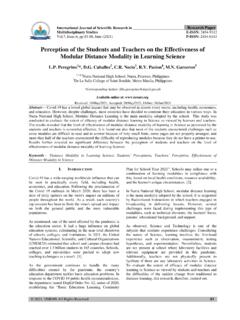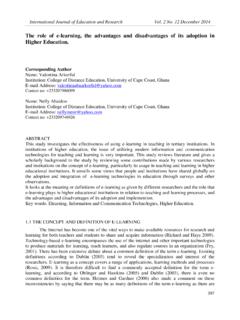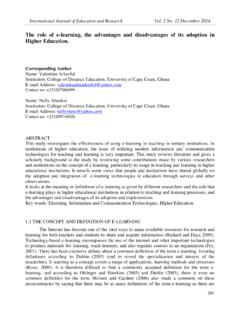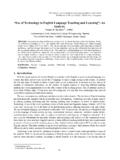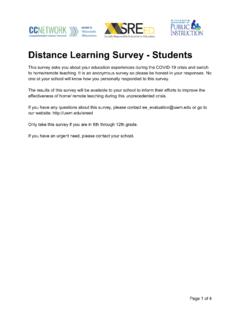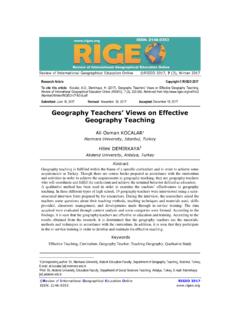Transcription of Learning Online: A Case Study Exploring Student ...
1 International Journal of teaching and Learning in Higher Education 2015, Volume 27, Number 3, 413-422 ISSN 1812-9129 Learning Online: A Case Study Exploring Student Perceptions and Experience of a Course in Economic Evaluation Jolene Skordis-Worrall University College London Hassan Haghparast-Bidgoli University College London Neha Batura University College London Jane Hughes Higher Education Development, Evaluation, and Research Associates This Study explored the perceptions and experiences of a group of students enrolled in an online course in Economic Evaluation. A mixed methods approach was adopted for the data collection, and thematic analysis was used to synthesize the data collected and highlight key findings.
2 The participants identified several positive and negative perceived attributes of online Learning , many of which are well documented in the literature. In addition, after exposure to the course, participants reported several factors that affected their Learning experience on this course, some of which have not yet been reported in the wider literature. The five main factors affecting Learning on this course include: 1) pace of Learning in an online environment, 2) Learning style, 3) immediacy of feedback, 4) method of content delivery, and 5) issues around navigating content.
3 These findings could help improve online teaching practice and Learning quality in future courses. The number of online courses continues to grow in higher education, with many universities placing greater emphasis on expanding access to online education (Muirhead, 2007; Song, Singleton, Hill, & Koh, 2004). The drivers behind the fast growth of online Learning are varied including, but not limited to increasing accessibility, advances in communication technologies, increasing Student demand for online flexible or distance Learning , institutional need to maintain a competitive offering of diverse Learning platforms, and positive financial gains to institutions and students (Ali, Hodson-Carlton, & Ryan, 2004; Muirhead, 2007; Song et al.)
4 , 2004; Sun, Tsai, Finger, Chen, & Yeh, 2008). A variety of research studies have investigated distance and online Learning , originally from the perspective of faculty involved in the design and delivery of such courses (Ali et al., 2004; Song et al., 2004). In the last few years, however, the emphasis has shifted, and several authors (Ali et al., 2004; Dyrbye, Cumyn, Day, & Heflin, 2009; Ellis & Goodyear, 2010; Ellis, Weyers, & Hughes, 2013; Goodfellow & Lea, 2007; Hughes & Daykin, 2002; Kim, Liu, & Bonk, 2005; Ku & Lohr, 2003; Morris, 2011; Muilenburg & Berge, 2005; Sit, Chung, Chow, & Wong, 2005; Song et al.
5 , 2004; Sowan & Jenkins, 2013; Sun et al., 2008) have explored students perceptions, practices and experiences of online Learning . These studies, using quantitative surveys (Muilenburg & Berge, 2005; Sit et al., 2005; Sun et al., 2008), qualitative studies ( Dyrbye et al., 2009; Morris, 2011) or mixed methodology designs (Paechter, Maier, & Macher, 2010; Sowan & Jenkins, 2013), have identified positive and negative aspects of online Learning from students perspectives, such as flexibility, convenience, technical problems, delays in feedback, and feelings of isolation.
6 Studies of students working with Learning technologies (Ellis et al., 2013, Goodfellow & Lea, 2007, Gourlay & Oliver, 2014) have also revealed wide variation in Student conceptions, approaches, and practices. In their Study of campus-based undergraduates, Ellis et al. (2013) found a significant relationship between variations in conception and approach and variations in achievement. Further research on students experience of online Learning may be particularly important since rapid advances in information and communication technology (ICT), and the changes these have brought to the design and delivery of online courses, change learners perceptions of their online Learning experience (Song et al.)
7 , 2004). Therefore, continuous investigation of students perspectives of online Learning is needed to improve the design of online courses and optimize the Student Learning experience. That said, as a core function of higher education is to educate, and a positive Student experience may not necessarily be an instructional one, an important extension of this would be to focus on the nexus of Learning and teaching with research that explores or highlights pedagogical approaches to improve not only the learners online Learning experience, but also the breadth and depth of Learning on these courses.
8 University College London s (UCL) Institute for Global Health runs an MSc in Global Health and Development. Like many higher Learning institutions, UCL is keen to expand Student access to online Learning (UCL, 2010, 2011). One of the optional modules in this MSc is entitled Economic Evaluation in Health Care. Economic Evaluation is an intensive course designed to equip students with both a theoretical understanding of the epistemology of Skordis-Worrall, Haghparast-Bidgoli, Batura, and Hughes Learning Online 414 Economic Evaluation techniques and the practical skills to conduct their own basic cost effectiveness, cost utility, and cost benefit analyses.
9 For two years this course was delivered using a conventional, classroom-based approach. The course was well evaluated by students, but the course conveners felt that the practical nature of the course content ( a combination of interactive tutorials and practical exercises using technologies such as spreadsheets) lent itself better to an online Learning environment, and they elected to move the module to a new platform. However, there was some concern about how students might receive the move to online Learning . As such, it was decided to formally investigate the Student experience.
10 This paper reports the findings of that evaluation. Method Design of the Online Course Drawing on constructivist views of Learning and distance education research (Anderson, 2008; Fry, Ketteridge, & Marshall, 2009; Holmes & Gardner, 2006; Sharples, 2002), together with work on threshold concepts (Cousin, 2006; Meyer & Land, 2006), the online course was designed to provide online didactic components combined with peer-to-peer Learning , regular online contact with a tutor (through discussion forums, live-chat forum, and email), and the creation of a portfolio as the main assessment method.











